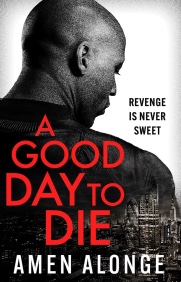
My debut novel, A Good Day to Die, is a gritty crime thriller set in London, my home and my favourite city in the world. Recently, I’ve been speaking about why I love London so much, and one of the many reasons is the city’s diversity. Naturally, this is mirrored in my novel. The principal characters in A Good Day to Die are:
- young men and women of African or Caribbean heritage;
- a young woman of East Asian heritage;
- two brothers of Pakistani heritage;
- a middle-aged Russian Jew;
- two Nigerian young men who spent most of their formative years in America;
- an elderly Persian man;
- a middle-aged American man with Italian ancestry; and
- a few white Englishmen.
A friend of mine recently asked how I came up with all those characters and was particularly interested in who I based the Nigerian characters on—I imagine he was hoping for himself ??.
‘No one,’ I answered.
‘Really?’ he questioned. ‘How do you make them so real, then?’
Well… here’s how I try.
Ever since I was a kid, I have enjoyed watching people. I wasn’t the quiet kid that watched from a distance either. I’d watch for a few minutes, make a few guesses about the person and approach to subtly test my guesses. Over time, the guesses became more educated. And then I enjoyed filling in the other parts of their lives—the unsaid significant moments that led us to share the same space at that precise time and influenced how they saw themselves and how they interacted with me and the others in the room. Early years of storytelling, I suppose. But I still do it. You should try it; it’s fun!
This form of storytelling was honed while studying for a screenwriting diploma at the London Film Academy. We were taught to write a character bible for all the central characters, but I enjoyed it so much I did it for every character. And it’s significantly benefited me today. Every character in A Good Day to Die has a detailed character bible, and most of the information doesn’t make it onto the page, but it certainly makes the characters feel real. This is because the characters are as real as they could get in my head, living in a world of my creation. With dreams, desires, vices, memories, and fears that influence every interaction. As it does for us real people.
This character development seamlessly aids dialogue. I find that when the characters are “real”, the dialogue tends to be authentic. Beyond the accents and slang, you know what the characters would say, what they won’t, what they’d laugh at, if they have a particular tic, and if, and how, they’d change their manner of speaking depending on the audience. This way, the dialogue pours out as naturally as you’d hope. But then, you have to get the slang and lingo right. Google is decent for that. But having family or friends that speak or spoke the lingo helps. I was born in Lagos and moved to Lagos when I was 17, so my wife, a born and bred Londoner, helped with the street slang and the London lingo, my mother helped with the Yoruba, Larry David helped with a few choice Jewish words, and decades of watching and reading American characters helped with the specific Chicagoan manner of Sean Pounds – my Italian American.
To finish, the way I develop my characters makes it a struggle for me to label any one of them as pure villains. I’m sure they are purely evil people out there, but my characters are three dimensional with the capacity to do good and bad … like the rest of us. Some of them just require less pressure to do bad, and when they do bad, they do it with relish. They are quite a few of those in A Good Day to Die. Enjoy!
‘Action-packed, gripping, and wildly entertaining‘ Adam Hamdy

Quercus
Meet Pretty Boy. Vengeance is on his mind.
His real name:
Unknown
His code of conduct:
Don’t be a pawn in someone else’s game.
Never underestimate the enemy.
Above all, survive. There is no glory in death.
His mission:
It’s been ten years since Pretty Boy left the big city – today he’s back. No one knows why, but it’s clear that revenge is on his mind: he is determined to make the person responsible for his exile from the London scene finally pay. But his plans seem derailed when he takes possession of a bracelet, unaware that its original owner has set a high price for its safe return. Suddenly, the hunter becomes the hunted and Pretty Boy will have to find out if it is indeed a ‘good day to die’.
Jam-packed with action, an unforgettable cast of characters and peppered with dry humour, A Good Day to Die marks the arrival of a fresh and exciting new voice in thriller writing.